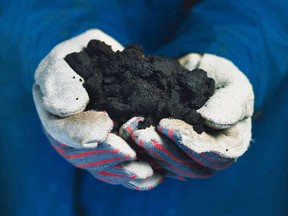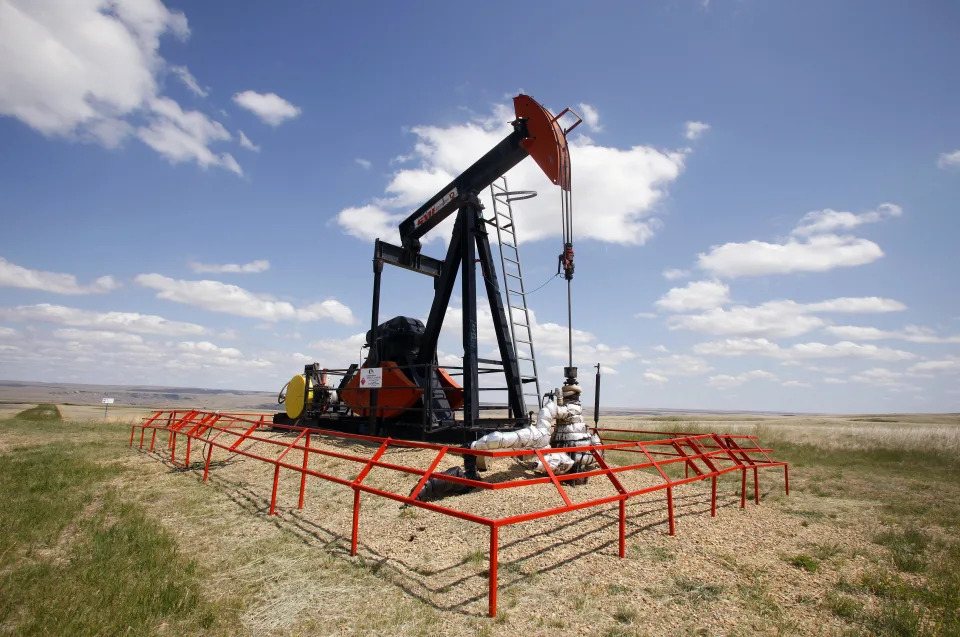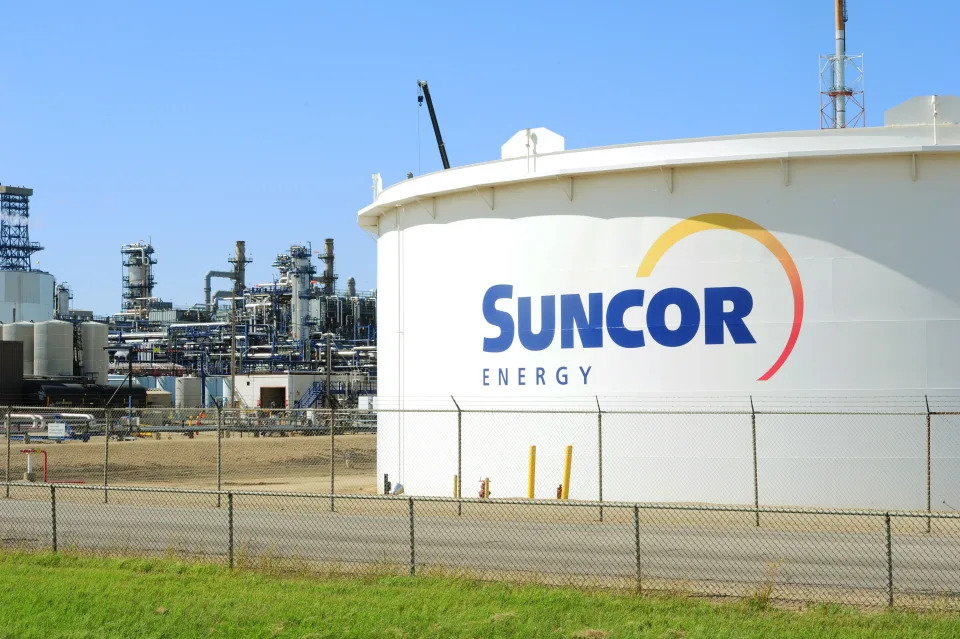Upstream growth takes a backseat as oilsands majors plow billions into buybacks and dividends
Critics say trend that is enriching shareholders and executives will cost the industry and economy
Author of the article: Meghan Potkins
Publishing date: Aug 04, 2022 • 
Article content
Canada’s oilsands majors are plowing outsized second-quarter profits into buying back their own shares, hiking dividend payments and knocking down debt rather than investing in upstream growth — a trend that could continue over the next decade as companies contend with a number of headwinds to increasing production, according to analysts who follow the sector.
High commodity prices and refining margins have driven record-breaking profits for energy companies in the second quarter of 2022 and, midway through earnings season, Canadian firms have so far elected to return billions in excess cash to investors.
“We leaned into the share buybacks quite heavily in Q2,” said Cenovus Energy CEO Alex Pourbaix on a conference call with investors last week. “I suspect going forward, we will be very much focused on shareholder value and we will go after one of the two of those — (buybacks or dividends) — depending on where we think we’re driving the most advantage for our shareholders.”
Canadian oilsands companies appear in lockstep with global energy firms that are boosting dividends and buying back shares as energy prices have risen amid tight supply and Russia’s invasion of Ukraine.
CNRL announced Thursday that it had generated approximately $3.3 billion in free cash flow during the second quarter and would be paying a special cash dividend to shareholders of $1.50 per common share on Aug. 31.
Imperial Oil Limited reported a sixfold increase in second-quarter profit Friday and said it had returned some $2.7 billion to shareholders between buybacks and a quarterly dividend — putting the company on track for a second consecutive record-setting year for cash returns.
MEG Energy launched an escalating share buyback program in the second quarter as the company reached a net debt level target of US$1.7 billion, triggering an allocation of 25 per cent of free cash flow to share buybacks. The Calgary-based company has repurchased some 7.24 million common shares for cancellation so far this year and has pledged to return 100 per cent of free cash flow to shareholders once a net debt floor of US$600 million is reached.
Cenovus returned an estimated $1 billion to shareholders through buybacks and dividends during the second quarter as the company posted net earnings of $2.4 billion. The oil producer also tripled its base dividend during Q2 and has teased the possibility of a variable special dividend.
While the buyback bonanza is popular with the current crop of energy investors, some critics say it enriches shareholders and executives at the expense of long-term growth in production that creates jobs and economic opportunity.
Companies have also come under fire from consumers over prices at the pumps and from a public tired of delays on efforts to decarbonize the sector.
Industry watchers say the current trend of little to no investment in upstream growth is understandable following nearly a decade of depressed prices and volatility that hampered or delayed investments in production — and one that may continue for the remainder of the decade.
“We’ve seen a shift in the mentality of investors behind these companies in terms of almost demanding a focus on prioritization of value over volume,” S&P Global analyst Kevin Birn said in an interview. “And so we see headwinds to being able to sanction incremental investments in upstream and because of that, it results in … less investment than we otherwise would have expected in the price environment we’re seeing.”
A recent report from S&P Global Commodity Insights suggested oilsands production could rise over the next decade by about half a million barrels a day — a substantial increase — but still below previous forecasts. More than four-fifths of the forecasted growth is expected to come from the ramp-up, optimization and completion of projects where some capital has already been invested, the report said.
MORE ON THIS TOPIC
'Time is incredibly tight': New report adds clarity to challenge of cutting oilsands' emissions

Enbridge takes 30% stake in Woodfibre LNG project

'Almost unrealistic': Imperial Oil, MEG, Cenovus ramp up opposition to Trudeau's carbon plan
Contributing to the drag on investment is concern about the likelihood of softening demand for fossil fuels over the long term. Federal policies, including the Trudeau government’s proposed cap on oil and gas emissions, could further cloud the likelihood of investment in the sector, said Birn, who co-authored the report.
“As we look forward we see increasingly ambitious climate policy that translates to higher prices which contributes to uncertainty about the ability of this sector to continue to grow within Canada,” Birn said.
“If you think that the world may be on a course where demand could soften in the near future, or even in the more distant future, you tend to discount the potential for growth from projects that take longer to be brought online then those that are more immediate.”
mpotkins@postmedia.com Twitter: @mpotkins
Critics say trend that is enriching shareholders and executives will cost the industry and economy
Author of the article: Meghan Potkins
Publishing date: Aug 04, 2022 •

An oilsands worker holds a handful of bitumen.
Energy companies here are focused on returning money to investors, rather than investing in long-term growth.
PHOTO BY GETTY IMAGES
Article content
Canada’s oilsands majors are plowing outsized second-quarter profits into buying back their own shares, hiking dividend payments and knocking down debt rather than investing in upstream growth — a trend that could continue over the next decade as companies contend with a number of headwinds to increasing production, according to analysts who follow the sector.
High commodity prices and refining margins have driven record-breaking profits for energy companies in the second quarter of 2022 and, midway through earnings season, Canadian firms have so far elected to return billions in excess cash to investors.
“We leaned into the share buybacks quite heavily in Q2,” said Cenovus Energy CEO Alex Pourbaix on a conference call with investors last week. “I suspect going forward, we will be very much focused on shareholder value and we will go after one of the two of those — (buybacks or dividends) — depending on where we think we’re driving the most advantage for our shareholders.”
Canadian oilsands companies appear in lockstep with global energy firms that are boosting dividends and buying back shares as energy prices have risen amid tight supply and Russia’s invasion of Ukraine.
CNRL announced Thursday that it had generated approximately $3.3 billion in free cash flow during the second quarter and would be paying a special cash dividend to shareholders of $1.50 per common share on Aug. 31.
Imperial Oil Limited reported a sixfold increase in second-quarter profit Friday and said it had returned some $2.7 billion to shareholders between buybacks and a quarterly dividend — putting the company on track for a second consecutive record-setting year for cash returns.
MEG Energy launched an escalating share buyback program in the second quarter as the company reached a net debt level target of US$1.7 billion, triggering an allocation of 25 per cent of free cash flow to share buybacks. The Calgary-based company has repurchased some 7.24 million common shares for cancellation so far this year and has pledged to return 100 per cent of free cash flow to shareholders once a net debt floor of US$600 million is reached.
Cenovus returned an estimated $1 billion to shareholders through buybacks and dividends during the second quarter as the company posted net earnings of $2.4 billion. The oil producer also tripled its base dividend during Q2 and has teased the possibility of a variable special dividend.
While the buyback bonanza is popular with the current crop of energy investors, some critics say it enriches shareholders and executives at the expense of long-term growth in production that creates jobs and economic opportunity.
Companies have also come under fire from consumers over prices at the pumps and from a public tired of delays on efforts to decarbonize the sector.
Industry watchers say the current trend of little to no investment in upstream growth is understandable following nearly a decade of depressed prices and volatility that hampered or delayed investments in production — and one that may continue for the remainder of the decade.
“We’ve seen a shift in the mentality of investors behind these companies in terms of almost demanding a focus on prioritization of value over volume,” S&P Global analyst Kevin Birn said in an interview. “And so we see headwinds to being able to sanction incremental investments in upstream and because of that, it results in … less investment than we otherwise would have expected in the price environment we’re seeing.”
A recent report from S&P Global Commodity Insights suggested oilsands production could rise over the next decade by about half a million barrels a day — a substantial increase — but still below previous forecasts. More than four-fifths of the forecasted growth is expected to come from the ramp-up, optimization and completion of projects where some capital has already been invested, the report said.

'Time is incredibly tight': New report adds clarity to challenge of cutting oilsands' emissions

Enbridge takes 30% stake in Woodfibre LNG project

'Almost unrealistic': Imperial Oil, MEG, Cenovus ramp up opposition to Trudeau's carbon plan
Contributing to the drag on investment is concern about the likelihood of softening demand for fossil fuels over the long term. Federal policies, including the Trudeau government’s proposed cap on oil and gas emissions, could further cloud the likelihood of investment in the sector, said Birn, who co-authored the report.
“As we look forward we see increasingly ambitious climate policy that translates to higher prices which contributes to uncertainty about the ability of this sector to continue to grow within Canada,” Birn said.
“If you think that the world may be on a course where demand could soften in the near future, or even in the more distant future, you tend to discount the potential for growth from projects that take longer to be brought online then those that are more immediate.”
mpotkins@postmedia.com Twitter: @mpotkins
Canadian Natural Resources profit soars 125%, announces special dividend
Jeff Lagerquist
Thu, August 4, 2022

A Canadian Natural Resources pump jack pumps oil out of the ground near Dorothy, Alberta, June 30, 2009. CNR is a large Canadian energy producer.

Jeff Lagerquist is a senior reporter at Yahoo Finance Canada. Follow him on Twitter @jefflagerquist.
Jeff Lagerquist
Thu, August 4, 2022
A Canadian Natural Resources pump jack pumps oil out of the ground near Dorothy, Alberta, June 30, 2009. CNR is a large Canadian energy producer.
REUTERS/Todd Korol (CANADA BUSINESS ENERGY)
Canadian Natural Resources (CNQ.TO)(CNQ) announced a special dividend on Thursday, adding to a parade of oil sands players doling out shareholder rewards fuelled by strong crude prices.
The Calgary-based oil and gas producer says profit in the second quarter more than doubled from a year ago, rising over 125 per cent year-over-year to $3.5 billion for the three months ended June 30.
Canadian Natural says cash flow from operations topped $5.9 billion compared to $2.9 billion a year ago, as the price of West Texas Intermediate (CL=F) crude averaged US$108 per barrel, up from US$66. After adjustments including dividend payments, the company says free cash flow for the quarter was $3.3 billion.
Canadian Natural says it will pay a special dividend of $1.50 per share on Aug. 31 to shareholders of record as of Aug. 23, double its current quarterly dividend of $0.75 per share.
“Strong execution across the company's operations year-to-date has resulted in substantial free cash flow generation,” chief financial officer Mark Stainthorpe stated in a news release. “As a result, our financial position continues to strengthen, allowing for incremental returns to shareholders.”
Canadian Natural ended the quarter with $12.4 billion in net debt, closing in on its “base level” of $8 billion. Once that target is reached, the company says it will allocate additional free cash flow to its shareholders. Canadian Natural said it paid out about $2.9 billion in the second quarter, including approximately $900 million in dividends, and $2 billion in share repurchases.
Daily production before royalties averaged 860,338 million barrels of oil equivalent per day (mboe/d) in the quarter, down from 872,718 in the same quarter last year.
Canadian Natural upped its full-year capital spending forecast to as much as $4.9 billion from $4.3 billion. It also raised its production guidance range to between 1,295 and 1,335 mboe/d.
Toronto-listed shares added 0.72 per cent to $67.38 as at 10:31 a.m. ET on Thursday.
Canadian Natural Resources (CNQ.TO)(CNQ) announced a special dividend on Thursday, adding to a parade of oil sands players doling out shareholder rewards fuelled by strong crude prices.
The Calgary-based oil and gas producer says profit in the second quarter more than doubled from a year ago, rising over 125 per cent year-over-year to $3.5 billion for the three months ended June 30.
Canadian Natural says cash flow from operations topped $5.9 billion compared to $2.9 billion a year ago, as the price of West Texas Intermediate (CL=F) crude averaged US$108 per barrel, up from US$66. After adjustments including dividend payments, the company says free cash flow for the quarter was $3.3 billion.
Canadian Natural says it will pay a special dividend of $1.50 per share on Aug. 31 to shareholders of record as of Aug. 23, double its current quarterly dividend of $0.75 per share.
“Strong execution across the company's operations year-to-date has resulted in substantial free cash flow generation,” chief financial officer Mark Stainthorpe stated in a news release. “As a result, our financial position continues to strengthen, allowing for incremental returns to shareholders.”
Canadian Natural ended the quarter with $12.4 billion in net debt, closing in on its “base level” of $8 billion. Once that target is reached, the company says it will allocate additional free cash flow to its shareholders. Canadian Natural said it paid out about $2.9 billion in the second quarter, including approximately $900 million in dividends, and $2 billion in share repurchases.
Daily production before royalties averaged 860,338 million barrels of oil equivalent per day (mboe/d) in the quarter, down from 872,718 in the same quarter last year.
Canadian Natural upped its full-year capital spending forecast to as much as $4.9 billion from $4.3 billion. It also raised its production guidance range to between 1,295 and 1,335 mboe/d.
Toronto-listed shares added 0.72 per cent to $67.38 as at 10:31 a.m. ET on Thursday.
Suncor earnings: Q2 profit more than quadruples to nearly $4B
Jeff Lagerquist
Fri, August 5, 2022

Suncor Energy facility is seen in Sherwood Park, Alberta, Canada August 21, 2019. REUTERS/Candace Elliott
Suncor Energy (SU.TO)(SU) booked a more than fourfold profit increase in its second quarter, driven by higher crude prices as the company's new interim CEO looks to pare down assets, and improve a battered safety record on the heels of worksite deaths.
The Calgary-based oil producer and refiner reported financial results for the three months ended June 30 after the closing bell on Thursday. Suncor says net earnings climbed to $3.996 billion, or $2.84 per share, compared to $868 million in the same period last year.
Suncor says adjusted funds operations topped $5.35 billion in the quarter, the highest in the company's history, as the price of North American benchmark crude averaged US$108 per barrel.
Total upstream production for the quarter was 720,200 barrels of oil equivalent per day (boep/d), compared with 699,700 boep/d a year ago. Suncor lowered its 2022 production forecast to 740,000 to 760,000 barrels per day from 750,000 to 790,000.
The company cited inflation and required spending on safety improvements as it nudged up its full-year capital expenditure forecast to $4.9 billion to $5.2 billion, from $4.7 billion.
Suncor's financial performance and safety record have been focal points for U.S. activist investor Elliott Investment Management. Mark Little stepped down as CEO on July 8, a day after the company's 13th worksite fatality since 2014.
"We must acknowledge where we have fallen short and recognize the critical need to drive our safety improvement work with focus and vigour," interim CEO Kris Smith stated in a news release on Thursday.
Under a deal between the two parties, Suncor appointed three new directors and agreed to review the sale of its Petro-Canada gas station chain.
At the same time, Suncor has started a sale process for its UK business, and signed a deal to divest its Norwegian assets for $410 million. In both cases, the buyers are undisclosed. Suncor expects to complete the Norwegian sale in the fourth quarter. In April, Suncor announced plans to sell its Canadian solar and wind operations as it looks towards hydrogen and renewable fuels, seen as more complementary to its core oil and gas business.
Suncor shares added 1.20 per cent to $31.10 as at 7:40 a.m. ET in U.S. pre-market trading. The stock has climbed more than 61 per cent in the last 12 months.
Jeff Lagerquist
Fri, August 5, 2022
Suncor Energy facility is seen in Sherwood Park, Alberta, Canada August 21, 2019. REUTERS/Candace Elliott
Suncor Energy (SU.TO)(SU) booked a more than fourfold profit increase in its second quarter, driven by higher crude prices as the company's new interim CEO looks to pare down assets, and improve a battered safety record on the heels of worksite deaths.
The Calgary-based oil producer and refiner reported financial results for the three months ended June 30 after the closing bell on Thursday. Suncor says net earnings climbed to $3.996 billion, or $2.84 per share, compared to $868 million in the same period last year.
Suncor says adjusted funds operations topped $5.35 billion in the quarter, the highest in the company's history, as the price of North American benchmark crude averaged US$108 per barrel.
Total upstream production for the quarter was 720,200 barrels of oil equivalent per day (boep/d), compared with 699,700 boep/d a year ago. Suncor lowered its 2022 production forecast to 740,000 to 760,000 barrels per day from 750,000 to 790,000.
The company cited inflation and required spending on safety improvements as it nudged up its full-year capital expenditure forecast to $4.9 billion to $5.2 billion, from $4.7 billion.
Suncor's financial performance and safety record have been focal points for U.S. activist investor Elliott Investment Management. Mark Little stepped down as CEO on July 8, a day after the company's 13th worksite fatality since 2014.
"We must acknowledge where we have fallen short and recognize the critical need to drive our safety improvement work with focus and vigour," interim CEO Kris Smith stated in a news release on Thursday.
Under a deal between the two parties, Suncor appointed three new directors and agreed to review the sale of its Petro-Canada gas station chain.
At the same time, Suncor has started a sale process for its UK business, and signed a deal to divest its Norwegian assets for $410 million. In both cases, the buyers are undisclosed. Suncor expects to complete the Norwegian sale in the fourth quarter. In April, Suncor announced plans to sell its Canadian solar and wind operations as it looks towards hydrogen and renewable fuels, seen as more complementary to its core oil and gas business.
Suncor shares added 1.20 per cent to $31.10 as at 7:40 a.m. ET in U.S. pre-market trading. The stock has climbed more than 61 per cent in the last 12 months.
Jeff Lagerquist is a senior reporter at Yahoo Finance Canada. Follow him on Twitter @jefflagerquist.
No comments:
Post a Comment